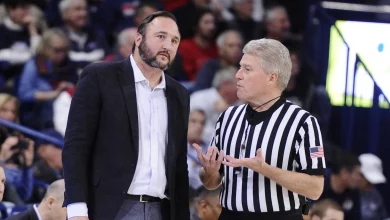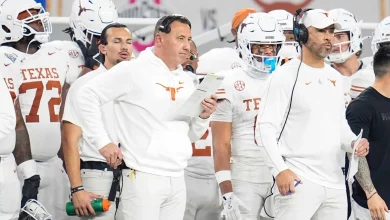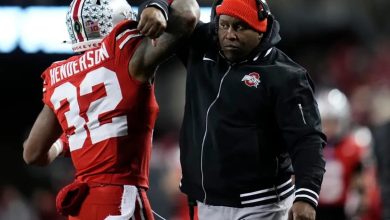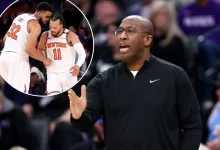Georgia will ‘continue to educate’ following the recent player arrests, says Kirby Smart.
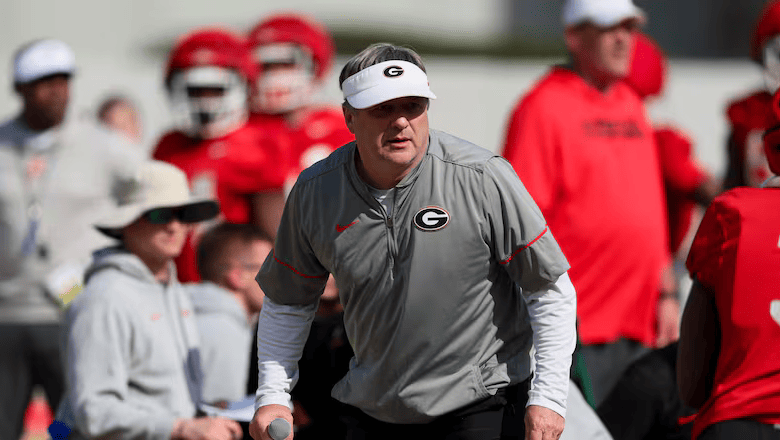
The University of Georgia (UGA) football program, one of the most prominent and successful in college football over the past several years, has been thrust into the spotlight recently not for its on-field achievements, but due to a series of player arrests that have raised serious concerns about the culture within the program. With a track record of dominance under head coach Kirby Smart, the Bulldogs have faced challenges off the field that have threatened to overshadow their success on it. In response to these incidents, Smart, ever the composed leader, has made it clear that the program will “continue to educate” its players to help them navigate the challenges of college life, while emphasizing the importance of making better decisions both on and off the field.
The recent arrests, involving a handful of Georgia players, have sparked discussions about accountability, responsibility, and the overall culture within one of the nation’s top football programs. While the Bulldogs have been praised for their football achievements—securing national championships and maintaining a dominant presence in the SEC—these off-the-field issues have prompted questions regarding the ethical and personal development of the players involved. Kirby Smart’s public statements following the arrests have been a mixture of concern, regret, and a renewed focus on character building.
The Recent Arrests: A Snapshot of the Situation
Before diving into the broader implications of Smart’s comments, it’s essential to understand the specifics of the recent incidents that led to the program being scrutinized. Over the past few months, multiple Georgia football players were arrested or charged with crimes that ranged from misdemeanor offenses to more serious allegations. While each incident had its unique circumstances, the frequency of the arrests created a sense of unease within the Georgia football community and among fans and pundits alike.
In particular, arrests that have made headlines include charges related to driving under the influence (DUI), reckless driving, and public intoxication, among others. The media coverage has shed light on the fact that several of these players were high-profile individuals on the team, which only amplified the situation. The Georgia football program, which has long been associated with discipline, focus, and accountability under Kirby Smart, found itself grappling with how to respond to these events.
While there have been no reports of violent crimes or egregious misconduct, the repeated legal issues have raised questions about the team’s internal environment and how the players are being managed and mentored both on and off the field.
Kirby Smart’s Response: The Importance of Education
In the wake of the arrests, Kirby Smart took to the media to address the situation and reassure fans, the university, and the public that the program was taking active steps to ensure that these issues were dealt with appropriately. While acknowledging the seriousness of the arrests, Smart emphasized that the program would continue to place an emphasis on education and the personal growth of each player as part of their holistic development.
“It’s disappointing,” Smart said in one of his press conferences. “We care deeply about our players and their well-being, and when something like this happens, it’s a reminder that we have to do better. We will continue to educate our players about the responsibilities they have as representatives of this university and this football program. We’ll continue to stress the importance of making good decisions, both in their personal lives and on the field.”
A Renewed Focus on Player Development
Smart’s comments highlighted the core philosophy that has defined his coaching career: a commitment to building not just football players, but well-rounded individuals who are capable of thriving in all areas of life. His vision for Georgia football extends beyond wins and losses on the field—it’s about helping players grow and mature into responsible adults, capable of handling both the demands of college life and the pressures that come with being a student-athlete at a major program.
For Smart, this “education” goes beyond the traditional classroom setting. It involves a holistic approach that includes mentorship, leadership training, and guidance in making difficult decisions. He recognizes that, for many of these players, college is not just a place to hone their football skills, but also an opportunity to learn about themselves and the world around them.
“We talk a lot about responsibility,” Smart explained. “When you come to Georgia, you represent so much more than just the football program. You represent your family, your teammates, your school, and the state of Georgia. These young men are given a great opportunity, and it’s important that they understand the responsibility that comes with that. Education doesn’t just happen in the classroom; it happens in the locker room, on the practice field, and in their everyday lives.”
Addressing the Broader Culture of College Football
The series of arrests and the response from Kirby Smart have also sparked a wider discussion about the culture within college football programs. While the vast majority of college football players conduct themselves responsibly, incidents like the one Georgia is currently facing raise questions about the broader culture within the sport.
College football, particularly at programs like Georgia, is an intense and high-pressure environment. The athletes are often under immense scrutiny, with every aspect of their lives being dissected by fans, media, and coaches alike. Many players come from difficult backgrounds, and college sports can offer them a path to success. But that success requires not only athletic talent but also the ability to navigate the complex social, academic, and personal challenges that come with being a student-athlete.
Some critics argue that college football programs focus too much on the on-field performance of their players and not enough on their personal development. Others believe that, because these athletes are treated like stars and are given significant resources, they can develop a sense of entitlement or disregard for the rules. Smart’s approach, which places a strong emphasis on “education” and “responsibility,” suggests that he recognizes the need to foster a more balanced, comprehensive approach to player development.
“It’s not just about what they do on the field,” Smart remarked in another statement. “It’s about who they become when they leave the program. These young men are not going to play football forever, but the lessons they learn here can serve them for the rest of their lives. It’s our responsibility as coaches to guide them through that process.”
The Role of Leadership and Accountability
For any football program, leadership is critical, and Georgia is no exception. Kirby Smart’s leadership has been a key factor in the Bulldogs’ rise to prominence in college football. Under Smart, Georgia has won two national championships and has consistently fielded one of the most competitive teams in the country. But beyond the wins and losses, Smart has made it clear that leadership and accountability are pillars of the program.
The recent arrests show that, while the program has had tremendous success, challenges remain when it comes to ensuring that players remain accountable for their actions off the field. Georgia’s leadership team, including Smart, has made it a priority to address this issue head-on. Smart has consistently emphasized that while players are allowed to make mistakes, they must also face the consequences of their actions and learn from them.
“Leadership is about setting the right example,” Smart said. “We hold our players to high standards, and that includes making sure they understand the impact of their decisions. We will continue to educate them and hold them accountable, not just for their actions, but for how they represent Georgia and the community.”
The Path Forward for Georgia Football
Moving forward, Georgia football faces the dual challenge of maintaining its success on the field while also addressing the recent off-field incidents. While the Bulldogs’ program remains one of the most successful in the nation, Smart and his staff will have to strike a delicate balance between nurturing player development and keeping the team focused on the goal of competing at the highest level.
Smart’s focus on education and accountability will be critical in ensuring that these incidents do not define the future of the program. While the recent arrests have undoubtedly cast a shadow over the team, the commitment to personal growth and responsibility that Smart is instilling in his players will help guide the program through these challenges. In the long term, the lessons learned from these incidents could serve to strengthen the program, helping to build a more resilient, mature, and disciplined team.
Ultimately, the Georgia football program’s success depends on more than just talent—it depends on the culture that Smart continues to build. By focusing on player education, leadership, and accountability, he is ensuring that the Bulldogs are not just winning on the field, but also growing as individuals. The program’s commitment to helping players develop into responsible, well-rounded individuals will be crucial in maintaining its success and legacy in college football.



